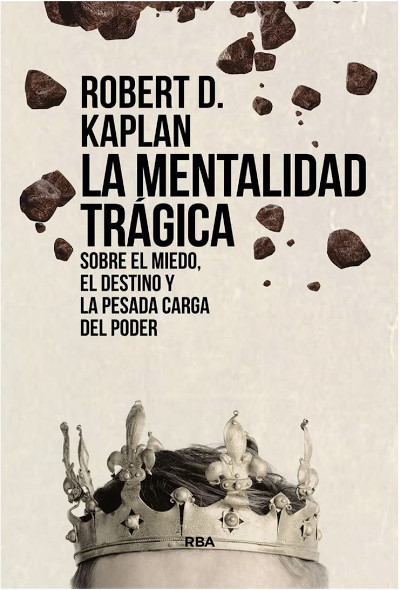In the picture
Cover of Robert Kaplan's book 'The Tragic Mentality. On fear, fate and the heavy burden of power' (Barcelona: RBA, 2023) 208 pages.
In the face of the illusion that everything is going to be all right, at International Office the correct attitude -both of the political decision-maker and the analyst- should be to put oneself in the worst case scenario, according to Robert Kaplan. This is the "tragic mentality" that Kaplan considers necessary for every statesman: to know that things can get enormously complicated, and that even then, from the assumed impotence of fighting against greater forces, victory is possible through cunning and tenacity; this is what happens in Greek tragedies, where the gods always play with the destiny of men and sometimes, in the end, are moved by the hero's daring.
The American Robert Kaplan, especially known for his geopolitical reflections closely linked to geographical accidents - from 'The Revenge of Geography' to 'Monsoon' or 'Earning the Rockies' -, returns in his latest essay, in a more intellectual than practical register, to the moral problem posed by the defense of national interests in the international arena. Are there ethics behind realism, a concept that assumes that the driving force in International Office is the struggle of interests, as Kaplan himself interprets it? The author already dealt with this ten years ago in 'Warrior Politics: Why Leadership Demands a Pagan Ethos' (2002). Already there he advocated facing decisions "in the light of worst-case scenarios" and recommended the humility of recognizing that he must make decisions despite the lack of information: "foreign policy is the opposite of the comprehensive knowledge ", he wrote. He focused on "the dark side" of events "not because the future will necessarily be bad, but because that is what foreign policy has always been about".
In that book there was still a glimpse of an ethical margin: using a pagan and public morality to advance, albeit indirectly, the private morality proper to the Judeo-Christian tradition; it was something permitted by an international order that, having just entered the 21st century, seemed to have averted the greatest risk to society: anarchy. Twenty years later, with the global order that then existed broken and the danger of an anarchic international constellation having returned, Kaplan dispenses with ethical aspirations to remain on a somewhat lower plane, that of the mental outline . The way to avoid tragedy is to think tragically, he says. And fear of the worst is what should prevent evil, Kaplan adds, in a crudely Hobbesian approach.
Classical Greek tragedy is part of the cultural background of Kaplan, who lived several years in Greece and has shown great interest in the history and literature of antiquity in the eastern Mediterranean. In his defense that "geopolitics is inherently tragic," the author specifies that "tragedy is not fatalism, it is not despair, nor is it related to the quietism of the Stoics. It is understanding. By thinking tragically, one is aware of one's limitations and can thus act more effectively. "Fatalism prevents pride and instills the awareness that there are always things about the world and about situations that we cannot know, which should make us humble." "We become wise only by realizing our own knowledge incompleteness." "Tragedy is complete only when the protagonist understands his own insignificance." "We must think tragically to avoid tragedy."
For Kaplan, the excessive self-confidence of U.S. policymakers and senior officials motivated the misjudgments that led to serious blunders in the Afghanistan and Iraq wars. He counters the "constructive pessimism" of Eisenhower, who, driven by both ambition and fear given his battlefield experience during World War II, sought armistice in Korea by declining to use the atomic bomb, decided not to enter Vietnam, and left the Soviet invasion of Hungary unanswered. Kaplan believes that the Washington elite hardly pays the price for its mistakes, which prevents "tragic sensibility" from maturing in that establishment, so that it stumbles over the same stone again.
Those who oppose the so-called "realistic" view of International Office and are more inclined to "idealism", which trusts in the virtue of man and his ability to overcome problems, will find this little work negative and uninspiring. However, there may be consensus on one thing: the need for those who bear the weight of power to move with great caution, because many times the unknown extremes -what in the jargon of decision making is called, in English, 'the unknowns'- are so great that the leader walks almost blindly.

